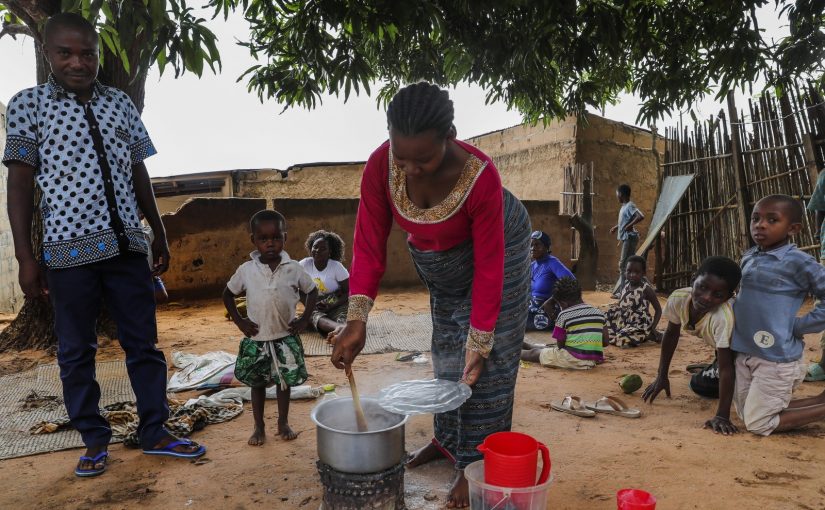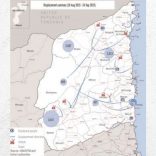Mozambique: Sasol breaks ground on new water supply system in Inhassoro
Mozambique: Food crisis may affect three million people by end of 2021 – report

The 2021 Global Report on Food Crises highlights the remarkably high severity and numbers of people in 'food crisis' or worse (IPC/CH Phase 3 or above) or equivalent in 55 countries/territories, driven by persistent conflict, pre-existing and COVID-19-related economic shocks and weather extremes. The number identified in the 2021 edition is the highest in the report’s five-year existence. The report is produced by the Global Network against Food Crises (which includes WFP), an international alliance working to address the root causes of extreme hunger. [File photo: Lusa]
Mozambique is facing a “deeply worrying” food crisis, according to the 2021 Global Report on Food Crises (2021 GRFC) published on Wednesday, and it is estimated that as many as three million people may experience food crisis or emergency this year.
The report, produced by The Global Network Against Food Crises (GNAFC) and presented at the United Nations, indicates that, between October and December 2020, about 2.4 million people in Mozambique were experiencing a ‘food crisis’, and 310,000 people a ‘food emergency’.
The ‘food emergency’ – stage 4 in the universal classification of acute food insecurity – is the second highest on the scale, with Stage 5 representing disaster situations.
GNAFC estimates that the number of people in need of urgent food assistance in Mozambique will increase by a further 250,000.
According to the study, during 2020, acute food insecurity was worst in districts in eastern Cabo Delgado province, Gaza and Inhambane provinces, southern Tete province, and one district in the Maputo region, all of which were classified as crisis situations, or stage 3 on the universal food insecurity rating scale.
“The escalation of the conflict in Cabo Delgado since the beginning of 2020, as well as conflict in Manica and Sofala, drove massive displacement, with IDPs (internally displaced persons) losing access to typical food and income sources, as well as to agricultural land and inputs,” the report reads.
Cabo Delgado was thus “by far” the province with the largest number of people in food crisis or worse, with almost 579,000 people in that situation, plus more than half of the national total of 306,000 people in a food emergency phase.
The United Nations estimates that the situation will worsen in Cabo Delgado during 2021. “The situation will continue to deteriorate, with an estimated 769,000 people in food crisis or worse, mainly due to the conflict.”
“The devastating impact of frequent cyclones, together with the effects of recent drought, conflict, sub-optimal access to health care and poor living conditions have produced several nutrition and health challenges,” the 2021 GRFC relates.
“Climate extremes, the subsequent destruction of water and sanitation infrastructure, conflict and mass displacement have contributed to recent disease outbreaks,” the report adds.
It estimates that “currency depreciation will exert greater pressure on commodity prices” in tandem with an anticipated fall in local production and increase in imports.
“From April to September, acute food insecurity is expected to improve [lessen] in rural areas as households obtain food from their own production and food prices stabilise,” the report concluded.
According to estimates made in early December by the World Bank, some 120,000 jobs in Mozambique have been lost as a result of to the Covid-19 pandemic.
Mozambique was part of a set of 55 countries, “chosen by consensus” among 16 partners in the study because they were “traditional” countries in crisis analysis, where problems already existed and data systems were already in place, World Food Program economist Arif Husain explained.
“Twelve countries saw large increases in absolute terms between 2019 and 2020. The biggest increases in the populations in Crisis or worse (IPC/CH Phase 3 or above) or equivalent were in the Democratic Republic of the Congo, northern Nigeria, the Sudan and the Syrian Arab Republic. Other countries that saw a major increase were Afghanistan, Burkina Faso, Burundi, Cameroon, Honduras, Mozambique, Sierra Leone and Uganda,” the 2021 GRFC presentation reads.
Africa is the region of the world worst affected by food shortages, with 97.9 million people living in the condition described.
- You may read, download the full “2021 Global Report on Foods Crises / Joint Analysis for Better Decisions” HERE. [ detailed information on Mozambique starts on page 188]












Leave a Reply
Be the First to Comment!
You must be logged in to post a comment.
You must be logged in to post a comment.